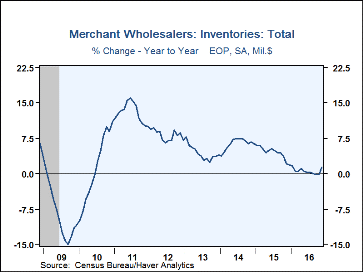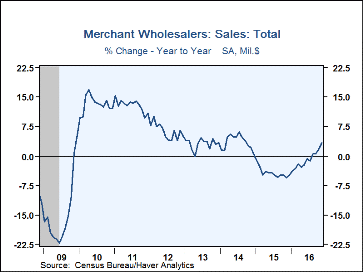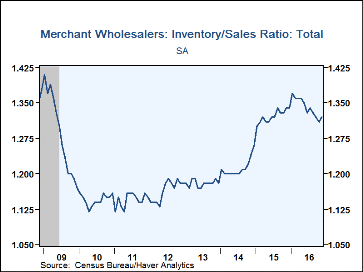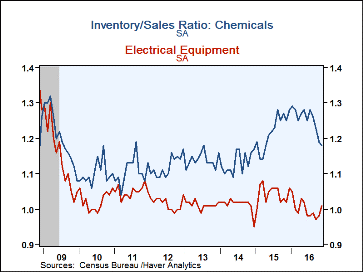 Global| Jan 11 2017
Global| Jan 11 2017Wholesale Inventories Surge
by:Tom Moeller
|in:Economy in Brief
Summary
Inventories at the wholesale level jumped 1.0% (1.6% y/y) during November following a revised -0.1% dip, initially reported as -0.4%. The advance report indicated a 1.3% November increase. Inventories of durable goods increased 1.0% [...]
Inventories at the wholesale level jumped 1.0% (1.6% y/y) during November following a revised -0.1% dip, initially reported as -0.4%. The advance report indicated a 1.3% November increase. Inventories of durable goods increased 1.0% (-0.3% y/y) after a 0.1% uptick. Motor vehicle inventories surged 3.2% (2.5% y/y), while furniture inventories rose 0.1% (3.7% y/y). Computer equipment stockpiles strengthened 2.0% (2.0% y/y), but machinery inventories were off 0.2% (-1.7% y/y). Inventories of nondurable products also strengthened 1.0% (4.1% y/y) after a 0.4% decline. Petroleum inventories increased 2.7% (10.9% y/y) while chemical stockpiles increased 0.9% (-0.8% y/y). Inventories of paper posted a 0.9% increase (3.4% y/y), but apparel inventories eased 0.5% (-4.0% y/y).
Wholesale sales increased 0.4% (3.4% y/y) after a 1.1% rise, initially reported as 1.4%. A 0.4% rise was expected in the Action Economics Forecast Survey. Nondurable goods sales improved 0.4% (4.3% y/y), but petroleum sales fell 3.5% (+9.2% y/y) following their 4.8% surge. Chemical sales increased 1.4% (4.8% y/y), but apparel sales declined 3.0% (-5.9% y/y). Sales of durable goods improved 0.4% (2.3% y/y) while electrical product sales declined 2.4% (-0.9% y/y). Metals sales increased 0.9% (-0.6% y/y). Motor vehicle sales improved 0.5% (2.3% y/y), and computer equipment sales rose 0.6% (-3.8% y/y).
The inventory-to-sales ratio of 1.32 remained lower than January's 1.37 peak. The durable goods ratio of 1.65 was down from the 1.72 around the middle of last year. The machinery I/S ratio eased y/y to 2.94, but the motor vehicles ratio remained steady y/y at 1.80. The computer industry's I/S ratio jumped to 0.86 from 0.79 in June. The electrical equipment industry's I/S ratio fell to 1.01 from its 1.08 peak during March of 2015. In the nondurable goods sector, the I/S ratio of 1.01 was down from 1.06 in February 2016. The chemical sector's ratio of 1.18 was down sharply y/y. In the petroleum sector, the I/S ratio of 0.47 compared to 0.57 nine months earlier.
The wholesale trade figures are available in Haver's USECON database. The Action Economic Survey results are contained in AS1REPNA.
| Wholesale Sector - NAICS Classification (%) | Nov | Oct | Sep | Nov Y/Y | 2015 | 2014 | 2013 |
|---|---|---|---|---|---|---|---|
| Inventories | 1.0 | -0.1 | 0.1 | 1.6 | 1.8 | 6.4 | 3.8 |
| Sales | 0.4 | 1.1 | 0.4 | 3.4 | -4.3 | 3.6 | 3.0 |
| I/S Ratio | 1.32 | 1.31 | 1.32 | 1.34 (Nov '15) | 1.32 | 1.21 | 1.18 |
Tom Moeller
AuthorMore in Author Profile »Prior to joining Haver Analytics in 2000, Mr. Moeller worked as the Economist at Chancellor Capital Management from 1985 to 1999. There, he developed comprehensive economic forecasts and interpreted economic data for equity and fixed income portfolio managers. Also at Chancellor, Mr. Moeller worked as an equity analyst and was responsible for researching and rating companies in the economically sensitive automobile and housing industries for investment in Chancellor’s equity portfolio. Prior to joining Chancellor, Mr. Moeller was an Economist at Citibank from 1979 to 1984. He also analyzed pricing behavior in the metals industry for the Council on Wage and Price Stability in Washington, D.C. In 1999, Mr. Moeller received the award for most accurate forecast from the Forecasters' Club of New York. From 1990 to 1992 he was President of the New York Association for Business Economists. Mr. Moeller earned an M.B.A. in Finance from Fordham University, where he graduated in 1987. He holds a Bachelor of Arts in Economics from George Washington University.
More Economy in Brief
 Global| Feb 05 2026
Global| Feb 05 2026Charts of the Week: Balanced Policy, Resilient Data and AI Narratives
by:Andrew Cates










